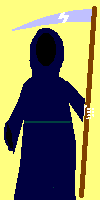 Terry Pratchett and Discworld
Terry Pratchett and Discworld Terry Pratchett and Discworld
Terry Pratchett and DiscworldMy favourite author at the moment is Terry Pratchett, and more specifically, the Discworld series of books. This page is my attempt to explain the appeal of this magnificent author, and convince YOU the idle surfer to find out more.
See also this other Discworld Web Site.
This is the biography which appears on the inside cover of each of the books.
Terry Pratchett has a beard and wears a hat, and is, therefore, cool. He frequently takes part in book signings, around the country, to promote his books, and I am told by someone who has met him that he is a very friendly bloke. When he was last in Exeter, to promote Hogfather people queued for upwards of four hours to get a signed book, which proves his mass popularity, if nothing else.Terry Pratchett was born in 1948 and is still not dead. He started work as a journalist one day in 1965 and saw his first corpse three hours later, work experience meaning something in those days. After doing just about every job it is possible to do in provincial journalism, except of course covering Saturday afternoon football, he joined the Central Electricity Generating Board and became press officer for four nuclear power stations. He'd write a book about his experiences if he thought anyone would believe it.
All this came to an end in 1987 when it became obvious that the Discworld series was much more enjoyable than real work. Since then the books have reached double figures, and have a regular place in the bestseller lists. He also writes books for younger readers. Occasionally, he gets accused of literature.
Terry Pratchett lives in Wiltshire with his wife Lyn and daughter Rhianna. He says writing is the most fun anyone can have by themselves.
Terry Pratchett is best known for his Discworld series of books. (The twenty-first, and most recent title is Jingo, which has just been published in hardback) This page is mainly devoted to the Discworld series, but Terry Pratchett has also written a number of titles for children, including Truckers, Diggers, Only you can save Mankind and Johnny and the Bomb . Many titles are availible in Audio Format, and the Discworld series has a number of spin-offs, including graphic novels (i.e comics), stage adaptations, by Stephen Briggs, maps of locations featured in the books etc. etc. The current spin-off is The Unseen University diary. As I have only a brief knowledge of these products (Acquired by flicking through the pages of books in W.H. Smiths) I cannot properly assess their literary quality.
Although Terry Pratchett has attempted to make each book stand alone, in the context that one does not have to have read previous books in the series (The books can be read in any order, basically) I have provided a guide to the most important points. This document may provide new readers with a flavour of what the books are about. (But see the next section)
The guide is currently under construction, and will appear here eventually.
Quite simply, because they are very funny, and extremely well- written. OK, so perhaps that is not a reason in itself, and many other authors, both contemporary and otherwise, have produced well-written, and funny books, but the Discworld novels are more than just amusing stories. Without wishing to dwell on material covered in my Discworld guide, the action in the novels takes place on a separate world, which happens to be disc shaped. This "Disc World" bears more than a passing resemblance to J.R.R. Tolkein's Middle Earth, so the world is populated with Dwarves, Elves, Hobgoblins, Trolls, Witches, Wizards, etc, and magic plays an important part. However, the richest seam of humour in the novels is the parallel between the Discworld, and our own world. So the Discworld has a University, where students study magic; the students get drunk, and rarely go to lectures, and in any case, the academic staff (Wizards) have a very low opinion of students anyway, and would rather not teach them at all. Sound familiar? The fact that the books have a Tolkienesque setting means that the Librarian at the University can be an Orang-utang, which is not possible in a conventional setting (Well it would be possible, but one couldn't have characters reacting to him in a normal way). This means that people who wouldn't normally read a Dungeons & Dragons style book will still enjoy a Pratchett Discworld novel, because the rich source of humour based on human observation (The fact that the characters are rarely human is not important) makes the setting irrelevant. People who just enjoy a funny book will like the Discworld books anyway.
People who don't like funny books will not like the Discworld books.
The best advertisment for the books are the books themselves. Stop reading this now, go to a bookshop, buy one of the books (and read it), and then you'll realise what I've been wittering on about. You won't regret it.
As I have mentioned, the books can be read in any order, however, there are two points, which I ought to mention:-
Return to my home page.
Last updated 9th April, 1998